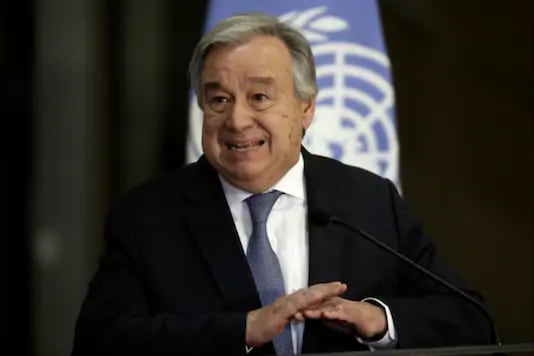With the COVID-19 pandemic soon reaching the grim milestone of a million deaths, UN Secretary General Antonio Guterres on Tuesday chided those countries who are making "side deals" to have vaccine exclusively for their own populations, saying such "vaccinationalism" is "self-defeating."
"We are working to advance treatments and therapies as a global public good and backing efforts for a people's vaccine available and affordable everywhere. Yet some countries are reportedly making side deals exclusively for their own populations, Guterres said.
"Such 'vaccinationalism' is not only unfair, it is self-defeating. None of us is safe, until all of us are safe. Likewise, economies cannot run with a runaway pandemic, he said in his address to the 75th session of the UN General Assembly that commenced on Tuesday in the shadow of the devastating and still raging COVID-19 pandemic.
Global organisation Oxfam has warned that wealthy nations representing just 13 per cent of the world's population have already cornered more than half (51 per cent) of the promised doses of leading COVID-19 vaccine candidates. Oxfam said the efforts of rich countries, especially the US, to adopt a me first nationalistic approach prevents coordination and could prevent or delay the vaccine from reaching people who are at most risk, both living in developing countries and here at home. The COVID-19 pandemic has so far infected over 30 million people and more than 958,000 people have died. The US, with 6.7 million infections, crossed the grim milestone of 200,000 deaths.
Guterres said that since the beginning of the pandemic, the UN has pushed for a massive rescue package worth at least 10 per cent of the global economy. "Developed countries have provided enormous relief for their own economies. They can afford it. But we need to ensure that the developing world does not fall into financial ruin, escalating poverty and debt crises. We need a collective commitment to avoid a downward spiral, he said. The UN system, led by the World Health Organisation, has supported governments particularly in the developing world to save lives and contain the spread of the virus, he said. "Our global supply chains have helped to provide personal protective equipment and other medical supplies to more than 130 countries, Guterres said, adding that the UN has has extended life-saving assistance to the most vulnerable countries and people through a Global Humanitarian Response Plan.
The UN's Verified' campaign is also fighting misinformation online in and of itself a toxic virus shaking the democratic underpinnings in many countries, he said. Guterres also gave a clarion call for an inclusive and effective multilateralism that meets the test of the 21st century, cautioning that countries cannot respond to the crisis created by the COVID19 pandemic by withdrawing into national shells.
"More than seven decades on, multilateral institutions need an upgrade to more equitably represent all the people of the world, rather than giving disproportionate power to some and limiting the voice of others, he said. "We don't need new bureaucracies. We need a multilateral system that constantly innovates, delivers for people, and protects our planet," he added. He underscored that 21st century multilateralism must be networked – linking global institutions across sectors and geographies, from development banks to regional organizations and trade alliances.
"To overcome today's fragilities and challenges we need more international cooperation – not less; strengthened multilateral institutions – not a retreat from them; better global governance – not a chaotic free-for-all, he said. Calling on nations to stand united and act in solidarity in the hour of the global crisis, Guterres said, "when countries go in their own direction, the virus goes in every direction.
He also urged countries to be guided by science and tethered to reality in combating this pandemic. The UN chief said that in order to truly reduce fragilities and risks, and to more effectively solve shared problems, we need a corresponding New Global Deal at the international level.
He said this New Global Deal is about ensuring that the global political and economic systems deliver on critical global public goods, as he noted with concern that today that is simply not happening. "We have huge gaps in governance structures and ethical frameworks. To close these gaps, we need to ensure that power, wealth and opportunities are broadly and fairly shared, he said.
He underlined that the New Global Deal must address historical injustices in global power structures. Guterres also strongly asserted that special focus has to be put on women and girls as the world strives to recover from the pandemic and build back better.
He said women do most of the unpaid care work generated by the pandemic and women have fewer economic resources to fall back on, because their wages are lower, and they have less access to benefits. The UN chief warned that unless we act now, gender equality could be set back by decades.
He called on nations to stamp out the horrifying increase in violence against women and girls during the pandemic, from domestic violence to sexual abuse, online harassment and femicide.
